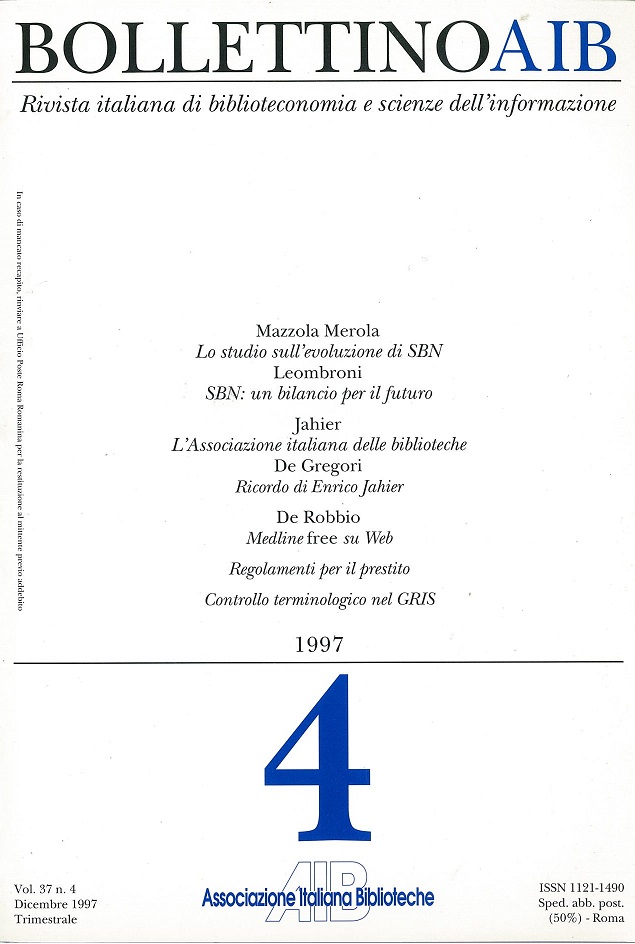Medline free on the Web
Main Article Content
Abstract
(Daily prayer of a doctor, composed by Mosheh ben Maymon called also Ramban or Mosè Maimonide)
Centuries ago the possibility of printing rather than handwriting books permitted the spread of culture and information. Nowadays, both computers and Internet will contribute to the diffusion of an even larger amount of information among ordinary people.
Even in the health care delivery field the landscape is changing. Citizens are increasingly turning to the Web as a source of information to improve their daily lives, so it is vital that citizens, as well as the health professionals who serve them, have access to the most current and reliable information.
A step toward this achievement is providing free access, via Internet, to Medline, the most comprehensive medical bibliographic database, to other relevant databases such as Aidsline, and to the Human Gene Map. This is now accomplished by means of two Web-based services offered by the U.S. National Library of Medicine of Bethesda, PubMed (a new service) and the already existing Internet Grateful Med. The services were demonstrated by U.S. Vice President Al Gore at a press briefing on June 26, 1997.
These services will prove to be a great advantage for both doctors and ordinary people. Previously, access to the whole Medline database required payment of a subscription; there were also some sites which offered free access to a selected part of Medline, mostly with unfriendly interfaces not so much refined.
Since citizens now have access to more information about themselves, their health, prevention and treatment, physicians are stimulated to keep up to date on developments and discoveries in medicine and biology in order to deal with their better informed patients.
Such information is often the critical link in reaching the correct diagnosis, resulting in lives saved, unnecessary treatment avoided and hospitalization reduced. Having scientific information free on Internet will limit the spread of incomplete or misleading news concerning fitness and medicine in magazines.
School teachers and students (high school and college science classes) will also benefit from this public service for their studies, because they will be able to search through Medline and the Human Gene Map and learn about inherited diseases located in our chromosomes, in terms that the public can understand.
PubMed offers different levels of information retrieval:
- basic/general: easy to use for any search;
- advanced: Boolean operators and selected search areas, to be used for a more specific search;
- specialized: search on an even more specialized basis, conceived for physicians and experts; it will permit the selection of strictly relevant information.
The database provider will also benefit from this services. Information is available free on the WWW, but such free access offers the public a large gamma of new services with added value: publishers can be contacted for the full text of an article after payment of a subscription to the journal; original articles can be downloaded or printed directly on the user's PC provided the user has a plug-in software. Users may have an article printed and forwarded via e-mail or fax and must pay for this service.
Unfortunately, while this is certainly true for the United States, it is not so for Italy. Most American citizens can use a personal computer and have access to the Internet; on the other hand, in Italy only a minority of the population is able to use a PC and even fewer can access Internet. Moreover the slowness of connections generally induces librarians and specialists to prefer the CD-ROM versions.
In Italy PubMed can be accessed via the very useful Dematel site. Dematel provides a easy to use and friendly interface in Italian, linked to Medline and PreMedline data.
In conclusion, it is important that information professionals should make every effort to benefit from new services on the net, but without abandoning tried and tested techniques they know well and rely on.
ANTONELLA DE ROBBIO, Biblioteca del Seminario matematico, Università degli studi di Padova, via Belzoni 7, 35131 Padova, e-mail derobbio@math.unipd.it.Article Details

This work is licensed under a Creative Commons Attribution-ShareAlike 4.0 International License.
